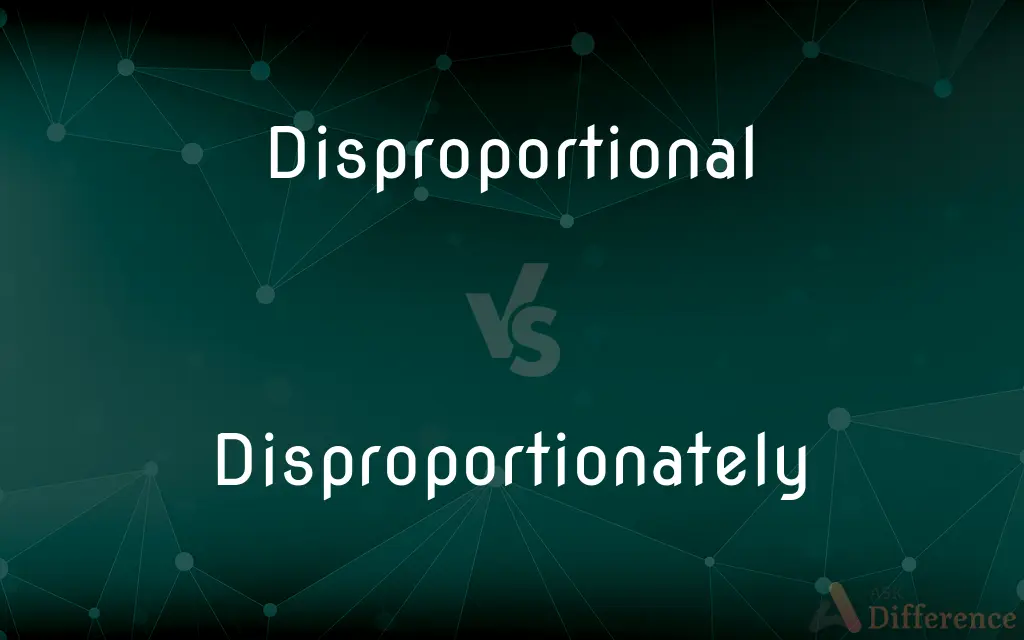Disproportional vs. Disproportionately — What's the Difference?
Edited by Tayyaba Rehman — By Maham Liaqat — Updated on April 4, 2024
Disproportional describes something not in proportion, emphasizing the state or condition, while disproportionately focuses on the manner or degree of being out of proportion.

Difference Between Disproportional and Disproportionately
Table of Contents
ADVERTISEMENT
Key Differences
Disproportional is an adjective used to describe the quality or state of being not in proportion, indicating a lack of balance or symmetry in size, amount, or degree. Whereas, disproportionately is an adverb that describes how something occurs to an extent that is out of proportion with something else, focusing on the manner in which imbalance is manifested.
Disproportional often refers to tangible or quantifiable disparities, such as physical dimensions or numerical imbalances. On the other hand, disproportionately can apply to abstract concepts, actions, or outcomes, emphasizing the extent or degree of disproportion.
In the context of social issues, disproportional might describe the representation or treatment of groups within a population. Meanwhile, disproportionately is used to detail the manner in which such disproportional representation or treatment occurs, often highlighting a significant imbalance.
When discussing resources, disproportional might be used to characterize the distribution among different entities, suggesting an uneven allocation. Conversely, disproportionately delves into how this distribution happens, implying a degree of unfairness or bias in the process.
In environmental studies, something might be described as disproportional if it deviates significantly from what is typically expected in natural proportions. Disproportionately, in contrast, could describe the impact of human activities on the environment, suggesting that the effect is much greater or lesser than one's share or contribution would suggest.
ADVERTISEMENT
Comparison Chart
Part of Speech
Adjective
Adverb
Definition
Describing the quality or state of being not in proper proportion.
Describing the manner or degree to which something is out of proportion.
Usage in Sentence
"The image was disproportional, making the building look taller."
"Resources were used disproportionately, favoring certain areas."
Focus
Emphasizes the state or condition of imbalance.
Emphasizes the manner or degree of imbalance.
Application
Often applied to tangible disparities (e.g., sizes, amounts).
Primarily used to describe the manner of occurrences or actions.
Compare with Definitions
Disproportional
Not corresponding in size, degree, or intensity.
The disproportional response to the incident escalated tensions.
Disproportionately
In a manner that deviates significantly from an expected proportion.
The disease affects older adults disproportionately.
Disproportional
Not proportionate to something in terms of quantity or degree.
The punishment felt disproportional to the crime.
Disproportionately
To an extent that is too large or too small in comparison with something else.
The law affected small businesses disproportionately.
Disproportional
Lacking symmetry or balance.
The sculpture's disproportional features intrigued the viewers.
Disproportionately
Exceeding or falling short of a proportional distribution.
Certain regions benefited disproportionately from the investment.
Disproportional
Deviating from what is usual in proportion.
Their share of profits was disproportional compared to their input.
Disproportionately
In a way that lacks balance or equity.
Funding was distributed disproportionately, raising concerns.
Disproportional
Characterized by unequal ratios or distributions.
The disproportional allocation of resources caused dissatisfaction.
Disproportionately
With an uneven or unfair ratio.
The penalties were applied disproportionately among different groups.
Disproportional
Disproportionate.
Disproportionately
Out of proportion, as in size, shape, or amount.
Disproportional
Disproportionate
Disproportionately
In a disproportionate manner
Disproportional
Not having due proportion to something else; not having proportion or symmetry of parts; unsuitable in form, quantity or value; inadequate; unequal; as, a disproportional limb constitutes deformity in the body; the studies of youth should not be disproportional to their understanding.
Disproportionately
To a disproportionate degree;
This wall is disproportionately long
Disproportional
Out of proportion
Disproportionately
To a disproportionate degree;
His benefits were disproportionately generous
Common Curiosities
Can an action be described as disproportional?
While actions can be described as disproportional, it is more common to use disproportionately to describe the manner or degree of the action's disproportion.
What does disproportional mean?
Disproportional describes something that is not in proper proportion in size, amount, or degree.
Can something be disproportional and still fair?
Something can be disproportional in terms of numerical balance but might be considered fair based on context-specific criteria.
Is disproportionality a noun form of these terms?
Yes, disproportionality is the noun form, referring to the state of being disproportionate.
Is disproportional always negative?
Disproportional usually indicates a lack of balance, which can be perceived as negative, depending on the context.
How is disproportionately used in a sentence?
Disproportionately is used to describe how something occurs in a manner that is out of proportion compared to something else.
What is the difference between disproportional and disproportionate?
They are variants of the same concept, but disproportional is an adjective, while disproportionate can function as both an adjective and adverb, with a slight preference for disproportional in certain contexts.
Can a situation be described as disproportionately good?
Yes, a situation can be described as disproportionately good if the positive outcome exceeds what would be expected based on proportion or fairness.
How do you measure disproportionality?
Disproportionality can be measured through ratios, statistical analysis, and comparisons to a baseline or expected proportion.
What fields study disproportionality?
Fields such as sociology, economics, and environmental science study disproportionality to understand its impacts and causes.
How does disproportionality affect society?
Disproportionality can highlight inequalities and imbalances in various aspects of society, from resource distribution to representation.
Can technology cause disproportional impacts?
Yes, technology can have disproportional impacts, benefiting or disadvantaging certain groups more than others.
What is a common misconception about disproportional?
A common misconception is that disproportional always refers to something negative, whereas it technically denotes a lack of proportion, which can be neutral or context-dependent.
How can disproportional effects be mitigated?
Addressing disproportional effects often requires targeted policies, equitable resource distribution, and awareness of underlying causes.
Can disproportionality be positive?
Yes, in contexts where the outcome exceeds expectations in a positive manner, it can be considered positively disproportionate.
Share Your Discovery

Previous Comparison
Fireteam vs. Squad
Next Comparison
Tambura vs. OudAuthor Spotlight
Written by
Maham LiaqatEdited by
Tayyaba RehmanTayyaba Rehman is a distinguished writer, currently serving as a primary contributor to askdifference.com. As a researcher in semantics and etymology, Tayyaba's passion for the complexity of languages and their distinctions has found a perfect home on the platform. Tayyaba delves into the intricacies of language, distinguishing between commonly confused words and phrases, thereby providing clarity for readers worldwide.














































